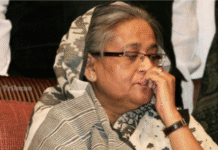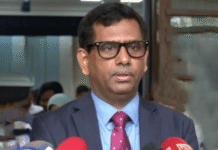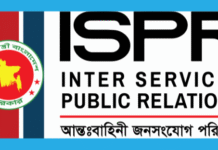
Foreign Minister AH Mahmood Ali holds a meeting with diplomats of western countries and representatives of aid agencies over Rohingya crisis at State Guest House Padma in Dhaka on Sunday. — New Age photo
Bangladesh on Sunday said genocide was going on in Rakhine State and presented an eight-point proposal for Myanmar and the international community for sustainable resolution of the Rohingya crisis.
Foreign minister AH Mahmood Ali presented the proposals in two briefings for foreign diplomats in Dhaka about the Rohingya crisis. Later, he briefed journalists on the situation.
Foreign minister told journalists, citing two Myanmar ministers’ statements that people with proof of Myanmar citizenship would be taken back to the country, that ‘houses and villages have been burnt… This is a genocide going on. How proofs would be provided when everything is burnt.’
Referring to unofficial sources, the foreign minister told the diplomats that over 3,000 Rohingyas were killed and more than 10,000 houses burnt in the security operations since August 25.
He said about 3,00,000 people entered recently from Rakhine State, raising the total number of Myanmar nationals living in Bangladesh to over 7,00,000.
The four-point proposal to Myanmar was to immediately stop current violence in Rakhine State, ensuring protection of civilians irrespective of ethnicity and religion by creating safe zones inside Myanmar, engaging Bangladesh for repatriation of all Myanmar nationals living here through international verification and taking immediate measures for implementation of the recommendations of the Kofi Annan-led commission.
Another four-point proposal to the international community was finding ultimate solution to Rohingya crisis in Myanmar only as the root of the crisis ‘lies’ in the country, pressurising Myanmar to entirely implement the recommendations of the Kofi Annan-led commission, providing urgent humanitarian assistances for addressing current crisis and temporary relocation of Rohingyas (who entered Bangladesh) to Bhashan Char, and pursuing Myanmar in international platforms including the UN systems in New York and Geneva.
Ambassadors, high commissioners and mission chiefs of European and north American countries and international organisations in Bangladesh took part in the diplomatic briefing.
Replying to a question about what the government was doing for an immediate end to Myanmar atrocities, the foreign minister said, ‘Should we engage in war? We would not go for war. War is not a solution.’
He said the government was engaged in bilateral discussion with Myanmar and in multilateral platforms for political solution to the crisis.
When asked whether the government would demand trial for genocide in Rakhine State, foreign minister said that international community was talking about ongoing genocide. ‘Indeed, we will take those in consideration,’ he said.
Dean of the diplomatic corps George Kocherry, who is ambassador of Holy See in Dhaka, told New Age that international community ‘is trying to do something’.
Australian high commissioner Julia Niblett, Norway ambassador Sidsel Bleken and US charge de affairs Joel Reifman said that their countries stressed the need for implementation of the report of the Kofi Annan-led commission, formed by the Myanmar authorities.
State minister for foreign affairs M Shahriar Alam and foreign secretary M Shahidul Haque were present in the briefing.
State minister Alam said the government would hand over lands for setting up new camps for newly arrived Myanmar nationals.
Foreign secretary Haque also discussed the matter with diplomats of Japan and the KSA at his office on Tuesday.
The foreign ministry was also engaged with Chinese and Indian diplomats about Rohingya crisis, officials said.
German foreign minister Sigmar Hartmut Gabriel urged all sides, in a statement on Sunday, to contribute to de-escalation of violence and to protect the civilian population.
The Myanmar government ‘must allow’ aid and humanitarian organisations unlimited access to the affected areas in Rakhine State, he said.
US state department spokesperson Heather Nauert said, in a press statement in Washington on Sunday, that the US was ‘very concerned’ about the allegations of serious human rights abuses in Burma’s Rakhine State, including violent attacks and mass burnings of villages.
The US was closely working with the UN systems, ICRC and IOM to provide emergency assistance to Myanmar nationals staying in Bangladesh.
Source: New Age









